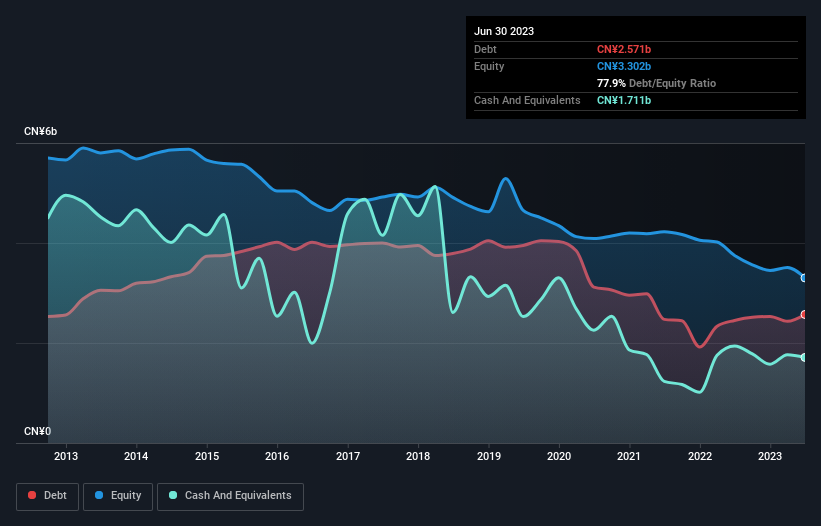We Think Parkson Retail Group (HKG:3368) Is Taking Some Risk With Its Debt

Legendary fund manager Li Lu (who Charlie Munger backed) once said, 'The biggest investment risk is not the volatility of prices, but whether you will suffer a permanent loss of capital.' So it might be obvious that you need to consider debt, when you think about how risky any given stock is, because too much debt can sink a company. We note that Parkson Retail Group Limited (HKG:3368) does have debt on its balance sheet. But should shareholders be worried about its use of debt?
Why Does Debt Bring Risk?
Debt and other liabilities become risky for a business when it cannot easily fulfill those obligations, either with free cash flow or by raising capital at an attractive price. Ultimately, if the company can't fulfill its legal obligations to repay debt, shareholders could walk away with nothing. However, a more frequent (but still costly) occurrence is where a company must issue shares at bargain-basement prices, permanently diluting shareholders, just to shore up its balance sheet. Of course, the upside of debt is that it often represents cheap capital, especially when it replaces dilution in a company with the ability to reinvest at high rates of return. The first step when considering a company's debt levels is to consider its cash and debt together.
See our latest analysis for Parkson Retail Group
What Is Parkson Retail Group's Net Debt?
As you can see below, at the end of June 2023, Parkson Retail Group had CN¥2.57b of debt, up from CN¥2.45b a year ago. Click the image for more detail. However, it also had CN¥1.71b in cash, and so its net debt is CN¥859.2m.

How Strong Is Parkson Retail Group's Balance Sheet?
According to the last reported balance sheet, Parkson Retail Group had liabilities of CN¥2.81b due within 12 months, and liabilities of CN¥5.10b due beyond 12 months. Offsetting these obligations, it had cash of CN¥1.71b as well as receivables valued at CN¥243.0m due within 12 months. So it has liabilities totalling CN¥5.95b more than its cash and near-term receivables, combined.
The deficiency here weighs heavily on the CN¥306.0m company itself, as if a child were struggling under the weight of an enormous back-pack full of books, his sports gear, and a trumpet. So we definitely think shareholders need to watch this one closely. At the end of the day, Parkson Retail Group would probably need a major re-capitalization if its creditors were to demand repayment.
In order to size up a company's debt relative to its earnings, we calculate its net debt divided by its earnings before interest, tax, depreciation, and amortization (EBITDA) and its earnings before interest and tax (EBIT) divided by its interest expense (its interest cover). The advantage of this approach is that we take into account both the absolute quantum of debt (with net debt to EBITDA) and the actual interest expenses associated with that debt (with its interest cover ratio).
Given net debt is only 1.4 times EBITDA, it is initially surprising to see that Parkson Retail Group's EBIT has low interest coverage of 0.59 times. So while we're not necessarily alarmed we think that its debt is far from trivial. Pleasingly, Parkson Retail Group is growing its EBIT faster than former Australian PM Bob Hawke downs a yard glass, boasting a 188% gain in the last twelve months. There's no doubt that we learn most about debt from the balance sheet. But it is Parkson Retail Group's earnings that will influence how the balance sheet holds up in the future. So when considering debt, it's definitely worth looking at the earnings trend. Click here for an interactive snapshot.
Finally, a business needs free cash flow to pay off debt; accounting profits just don't cut it. So we clearly need to look at whether that EBIT is leading to corresponding free cash flow. Over the last three years, Parkson Retail Group actually produced more free cash flow than EBIT. That sort of strong cash generation warms our hearts like a puppy in a bumblebee suit.
Our View
We feel some trepidation about Parkson Retail Group's difficulty level of total liabilities, but we've got positives to focus on, too. For example, its conversion of EBIT to free cash flow and EBIT growth rate give us some confidence in its ability to manage its debt. Looking at all the angles mentioned above, it does seem to us that Parkson Retail Group is a somewhat risky investment as a result of its debt. That's not necessarily a bad thing, since leverage can boost returns on equity, but it is something to be aware of. When analysing debt levels, the balance sheet is the obvious place to start. But ultimately, every company can contain risks that exist outside of the balance sheet. To that end, you should learn about the 3 warning signs we've spotted with Parkson Retail Group (including 1 which is a bit unpleasant) .
If, after all that, you're more interested in a fast growing company with a rock-solid balance sheet, then check out our list of net cash growth stocks without delay.
New: Manage All Your Stock Portfolios in One Place
We've created the ultimate portfolio companion for stock investors, and it's free.
• Connect an unlimited number of Portfolios and see your total in one currency
• Be alerted to new Warning Signs or Risks via email or mobile
• Track the Fair Value of your stocks
Have feedback on this article? Concerned about the content? Get in touch with us directly. Alternatively, email editorial-team (at) simplywallst.com.
This article by Simply Wall St is general in nature. We provide commentary based on historical data and analyst forecasts only using an unbiased methodology and our articles are not intended to be financial advice. It does not constitute a recommendation to buy or sell any stock, and does not take account of your objectives, or your financial situation. We aim to bring you long-term focused analysis driven by fundamental data. Note that our analysis may not factor in the latest price-sensitive company announcements or qualitative material. Simply Wall St has no position in any stocks mentioned.
About SEHK:3368
Parkson Retail Group
Operates and manages a network of department stores, shopping malls, outlets, and supermarkets in the People’s Republic of China.
Good value with mediocre balance sheet.
Similar Companies
Market Insights
Community Narratives



